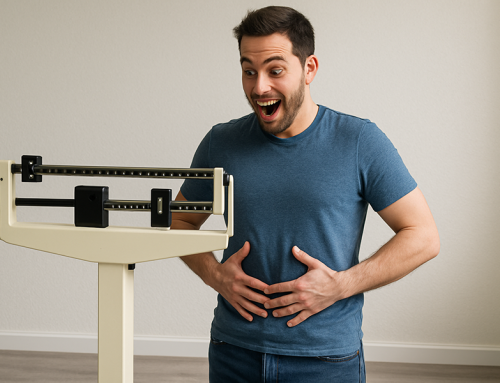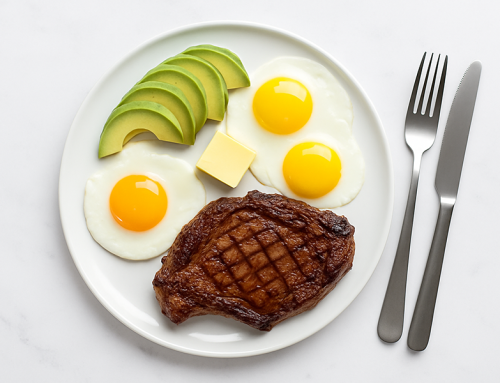Does fruit make you fat? Are bodybuilders right when they cut out fruit before competitions or is that unnecessary? These and other questions have been hotly debated for decades. In this short 4 minute audio, Kevin Larrabee of the Fit Cast show puts this question to Tom Venuto, who puts everything in perspective and gives you the final word on fruit, fructose and fat loss… click the play button below to listen…

AUDIO TRANSCRIPT:
KEVIN LARRABEE: Well, let’s jump right into the questions. The first one we have comes from Chris. He says, “I’m just curious, what are your thoughts about fructose? Should the average person avoid a lot of fruit? I tend to avoid starchy carbs altogether, instead focusing on lean protein, fruit and veggies, in addition to healthy fats. Should I be worried about the fructose stuff? I eat 3 to 5 pieces of fruit a day, and that includes apples, grapes, bananas, oranges and really whatever is on sale at the store.”
TOM VENUTO: I saw this topic got stirred up again just a few weeks ago. There was a study published in June, and it got written up in The New York Times, about fructose getting converted into fat. And you know how good the media is at reporting scientific research. Right? [sarcasm!]
KEVIN LARRABEE: Oh, it’s great. It’s fantastic. I go to The New York Times for all my nutrition information actually. [more sarcasm!]
TOM VENUTO: [laughs] Well, it was The Journal for the American Nutrition Society. The title, right off the bat, was really damning. It said, “Dietary Sugars Stimulate Fatty Acid Synthesis.” Then The New York Times’ article says, “Does Fructose Make You Fatter?” And everybody saw that and they’re like, “Oh, my God! Fruit is turning into fat!”
To tell you the truth, having started in the bodybuilding world, I believed that too. That’s what I was taught. I was taught that fruit turns to fat, and when you go on a contest diet, you have to cut the fruit out. So when I was just starting out in bodybuilding, in my first few contests, I cut the fruit out. And then I started to really analyze it and it didn’t seem to make any sense to me, so I put the fruit back in. I didn’t see one shred of difference.
If you really go and look at these studies, like this new one, they were talking about high fructose corn syrup, not whole fruit. We know that the fructose goes to preferentially restore the liver glycogen, and the liver has a limited storage capacity. Some of the studies suggest that about 50 grams of fructose before it starts to spill into fat, at least in the context of those studies.
But does anybody know how much 50 grams of fructose is? I mean, in terms of soda, or high fructose corn syrup, I don’t think it’s hard at all to get 50 grams. And in that study, they didn’t give people whole fruit. They gave them a big liquid dose that had 85 grams of carbs in a 75% fructose solution. That’s like 64 grams of fructose all at once. So there you have it. That’s consistent with what you’d expect based on the research.
Now, if you look at whole fruit, everybody saw the headline and they thought, “Fruit equals fructose.” But fruit and fructose aren’t exactly the same thing. A lot of people think that all the sugars in fruit are fructose. But a typical piece of fruit has what? About 6-7 grams of fructose? Maybe you’d get about 10 in a big banana, and some of the berries that are really high in fiber, have only 2-3 grams of fructose. So it would take almost an impossible-to-eat amount, especially if you’re trying to stay in a calorie deficit, for that to cause any fat storage. And if you’re in a calorie deficit for the day anyway, should we really be worried about it?
KEVIN LARRABBE: Yeah.
TOM VENUTO: I think fruit is good for a fat loss diet. You could actually make an argument that you should include it because it’s high in nutrients, it’s high in fiber; it’s high in water content, and we know that’s a combination right there (high fiber, high water) that’s good for reducing appetite and making you feel fuller. So maybe the pre-contest bodybuilder or the low carb dieter is going to pull back on fruit a little bit. But that’s mainly a function of cutting down on everything across the board — cutting down calories across the board and cutting down carbs across the board. Fruit is just too nutritionally valuable to get rid of.
KEVIN LARRABEE: Exactly. I think something that Craig Ballantyne said was that he’s never had a client that got fat by eating fruit. They got fat by having breads, like pastries, junk food, pizzas, things like that. You’re not going to get fat by eating fruit. I think people are just focusing on the wrong things.
TOM VENUTO: Yeah. Absolutely. Eat your fruit.
Related Articles:
The Facts About Fruit, Fructose And Fat Loss
(full research report – Burn The Fat Inner Circle members only)
References:
Dietary sugars stimulate fatty acid synthesis in adults. Parks EJ, Skokan LE, Timlin MT, Dingfelder CS. J Nutr. 2008 Jun;138(6):1039-46. Center for Human Nutrition, University of Texas Southwestern Medical Center, Dallas, TX 75390-9052, USA.
About Tom Venuto







Tom, for the past 5 years I have been applying your principles in the Burn The Fat, Feed The Muscle book. If the food that I am consuming has come from the ground, plant, or tree, or at one point either walked, flown, or swam, I’m going to fuel my body with it.Nutrition isn’t the rocket science that most people asume it to be. Keep it simple and follow those guidelines. Cut back on the man made refined foods and fuel your body with the nutrition that it deserves.I eat a couple apples each day and love to add banana’s and berries to my oatmeal. It curbs any sugar craving that I may experience and is a super alternative to a candy bar.Thanks for sharing the audio Tom. I’m floored that this is still a controversy.Scott Tousignanthttp://www.Unstoppable-FatLoss.com
Pertaining to fruit; I have heard that if you combine your consumption of fruit with a small portion of cheese, the cheese will either slow down or decrease the fructose absorption. I cannot remember the source, but the source stated that the French have a lot of cheese and fruit in their diets (not to mention wine), but you rarely see an overweight French person. Can anyone comment the validity of this?
As the principle of occams razor tells us, the simplest explanation is usually the correct one.The French Paradox, at least as it pertains to weight loss and french people being slimmer than americans in general, is mostly likely due to the French being more active and eating smaller portions. Even if the French eat what appears to be more indulgent and “fatty” foods, if they eat less than americans, that explains the difference.Dr. Brian wansink and Pierre chandon published a paper on this in the journal Obesity Research in dec 2007. he said that Parisians are better at using internal cues of feeling full to stop eating than americans are.Remember, there are major differences between various cultures. Look at the Okinawans — they practice :hari bachu bu”, which translated means “eat until you are only 80% full”heres the Wansink study”Internal and external cues of meal cessation: the french paradox redux?”http://www.nature.com/oby/journal/v15/n12/abs/oby2007348a.htmlregards
Hey Tom – This topic interests me b/c I removed all fruit from my diet after a plateau (with exception of grapefruit) and actually lost. I’m no nutritionalist or doctor, but I think the more stabilized my insulin is, the quicker/better results I get. Not exactly sure why, but I just thought I’d reply to let you know it may be more about insulin levels and less about just fructose. Food for thought! :)Love your newsletters, by the way. Thanks!
Selina, thanks for your comment. Many people report reducing carbohydrates, most commonly the grains and starches, but also fruit sometimes, and losing weight as a result. But it doesnt mean fruit is fattening. It means they ate fewer calories. Insulin control plays a role in body composition for sure, but not to the exclusion of energy balance – its the energy deficit that is the cause of the fat loss. Also, frutose is an insulin-independent monosaccharide which means it does not spike insulin and blood sugar like other carbs. The fructose content in most fruits is very low. Fruit juice and dried fruits might be best minimized or avoided if you have blood sugar concerns.
Excellent info. makes simple logic without much worry about distorted research ( for ulterior motives)
Thanks for this audio Tom! I got BFFM a week ago and have been non stop reading and absorbing it and was still a little concerned I was eating too much fruit, then I saw this in my inbox! It is as if you knew what I needed! I am loving the program by the way, I really enjoy eating every 3 hours!
I am doing something called bodytrim and they suggest that you do not eat fruit after breakfast due to the fructose in it and if you do eat it for breakfast to eat it with a protein portion, bodytrim is about eating protein 6 times a day, snacks are to be only protein and other meals are to have a serve of protein with as much salad or vegetables as you want.What’s your opinion?
Tracey, I have heard…although I can’t remember where that having protein with out the presence of carbs is not as useful/beneficial to the body as it could be. It was suggested that even fiborous carbs from veggies will suffice but again protein alone is not.In regards to fruit, I studied the glycemic index of most “clean eating” whole foods like grains, fruits and veggies. I found out that they whole glycemic index has many flaws and some of the emerging studies have developed similar but yet different methods of ranking these foods based on their affect on blood sugar levels. Most interesting-a small apple is stated to have 22 to 25 grams of carbs but only 15 of them are acutally available for the body to use. Unlike the grains which were pretty much in line with the old glycemic index measurements. I believe it stated that fiber content and other factors are responsible but I cant remember what. The point being fruit in appopriate portion sizes has less of an effect on blood sugar than grains and the like…despite the “fruit sugars”. This does not hold true for higher sugar content fruits like grapes and bananas.
Thabnks for the most simple explanation of a question that’s been bothering me about fruit and fructose. I have increased my fruit consumption and dropped the amounjt of “white” carbs (bread, pizza, etc.) and have lost an impressive # of lbs. Like you guys said: “Eat fruit”. And I’m a TypeII now with lower blood sugar.
Thanks for clearing this up Tom. This is definitely opposite of what a lot of “experts” tell us, but it makes sense.
I agree with Scott above- its SO much better to have a piece of fruit than a candy bar or something. Besides just having a LOT less calories and more nutrition, the flavor is generally much more vibrant.
I lost a hundred lbs. One of the things that helped me was eating fruit.